In the Beginning
This is pretty much the script from the talk given on 25th Jan 2009. If you are listening to the
podcast, it will make mores sense if you look at the video clips and images below.
Or
download the powerpoint.
Why is this important and relevant • The Atheist bus ad campaign was in the news again this week – apparently it hasn’t breached advertising standards. I don’t think it’s in Leeds yet, but there is a remarkable surge of public interest in the debate about whether God exists.

• Science Professor Richard Dawkins published a book called The God Delusion and one of the recurring themes of the debate is that science can explain almost everything – where everything came from, the psychology of religious experience. Many people assume that science has disproved the existence of God.
• It is the double anniversary of Darwin this year. 200 years after his birth and 150 years since he published “the Origin of Species”. You might have noticed that the BBC is running a Darwin season called “The genius of evolution”.
• Every young person in the country is told the story of the furious reaction of one or two churchmen to the theories of Darwin. In America there is a major public debate about what may be taught in schools about creation.
Creationism is apparently in conflict with science. Maybe a bit like a collision.
Do you come across this kind of conflict?
In magazine articles, almost every nature programme on TV, children’s books about dinosaurs, school science essays. Derren Brown, Richard Dawkins, John Humphreys. Large sections of Borders.
I read New Scientist – a weekly magazine which in recent years has taken a very definite editorial slant against faith. Sometimes I find myself torn in two – fascinated by what people are discovering about how things work, and yet almost overwhelmed by the constant need to rethink what I believe. Every possible question seems to be under scrutiny. Where did it all come from? Is consciousness real or an illusion. Are there really any choices in life? Why do we have morality. What is going on in the brain when people have religious experiences. Does prayer work?
Too much for one talk, don’t worry.

Do you ever feel this kind of collision?
Structure of seriesWe can’t cover everything about science and faith, but in this mini-series we’ll be looking at three aspects of it:
• Today we’ll look at: In the beginning – Layers of meaning in the creation account in Genesis 1 and how long it took - the age of the universe
•
It’s life Jim – evolution
• The evidence for design
• Would you Adam and Eve it? – Human origins and what do we make of the Adam and Eve story in Genesis 3? How special we are to God
I hope they won’t feel too much like science lectures: there’ll be talks, video clips, interviews and maybe even some discussion afterwards.
Aims of the seriesI’ve set out a number of aims for the series:
• I’d like it help us to
read the Bible properly. Sometimes scripture has been abused to force a conflict between science and faith.
• Simply thinking about
God and science together is good.
• As Erik said last week – God loves an enquiring mind.I have loved studying science – not just at school – it is an ongoing passion. I hope you also will come to
enjoy studying science• I hope it helps you
Spot the bias – in the media for example
•
Avoid the creationist caricature – and a particular challenge is to relate to Christians who think differently
• And finally I hope that our
Worship will be enriched: inspired by science
Not all today!
What’s your question?A little while ago I did a survey among the young people of Wharfedale Vineyard to find out what questions they had about science and faith. I’ll just read a couple:
• Why are dinosaurs not mentioned in the Bible? How do dinosaurs fit in?
• How come science says it took millions of years for the earth to form, and Genesis talks of 6 days?
• How could the world be made in 7 days – is it something to do with different perspectives on time?
• Could God have used the Big Bang?
• What about people who say God can’t be real because everything has been explained by science?
• Where do you draw the line in believing the “descended from monkeys” story?
• Why did God make Adam first?
• Does it matter if man came from monkeys?
• If we are evolved from monkeys, how come we are still not evolving?
• Why did God want to make us anyway?
• Why do women get such a hard time – periods, pain in childbirth.
And so on.
We’ll actually tackle a fair number of these questions in this little series.
As you can see I’ve divided them up into two sections:
• questions about Creation of the universe
• questions about the origins of humans – where did we come from
Today we’ll be looking at the first set of questions. In the beginning... what really happened?
Why does creation matter• It matters if you are trying to work out if life has any meaning or purpose?
• It matters because Who’s in charge of my life? Me or God?
• If we are nothing but a higher animal, perhaps morality is irrelevant Big implication
• If the creation story is disproven can we rely on any of the Bible?
It matters
In the beginning God created the heavens and the earth
John Stott’s favourite expression was “double listening” – he said we must learn to listen both to the Word of God (in the Bible) and to the world.
Here’s a bit of
double listening for you ( a parallel reading of Genesis 1 and a scientific account of the origins of the universe.
Agreement of the sciences, apparent conflict with the BibleYou have just heard two accounts of the beginning of the universe. Sort of parallel, sort of different too. In particular there is an apparent conflict over the matter of time.
Scientists tend to conclude that the earth is 4.5billion years old and the Universe is about 14 billion years old. Some Christians argue that the universe started in 4004BC and everything was created in 6 periods of 24 hours.
Let’s take a quick look at what each is based on.
On the science side, there are lots of different approaches to working out the age of the earth and of the universe in different disciplines. They are listed here, but I’ll just pick a couple that I find interesting:
• Counting tree-rings – some living trees are more than 4000 years old and by matching tree rings there is a German tree chronology extending back before 8400BC.
• Antarctic ice cores. Because of the seasons, each year you get a new layer of Antarctic ice a bit like a tree ring which you can count. So they have taken out a sort of tube of ice 3km long and have counted 740,000 layers. So there has been ice in Antarctica for at least 740,000 years.
• There are regular wiggles in the earth’s orbit and the tilt of its axis – measured in 100000s of years. These affect the climate and therefore what is in sedimentary rocks. And there is evidence dating back 30 million years.
• The magnetic field of the earth reverses every 300,000 years or so. So any magnetic bits in the volcanic layers under the sea point one way and then another way, in layers, dating back 170million years.
• Let’s look at radioactive decay. the way it works is because one kind of atom changes into another and each element has a set half-life. So if you measure the ratio of the original atoms to the decayed ones all stuck in the rock, you can work out how long it is since the original ones were fixed in the rock. When I started looking at this subject years ago there was some controversy over carbon dating which was the only one at that time – but now over 40 different radioisotopes are used for dating rocks. We’ve got rocks in Greenland which are 3.8billion years old, and by some clever comparisons with meteorites the age of the earth is reckoned to be 4.566billion years give or take a couple of million.
• How old is the universe? Well we can look at white dwarf stars. As they gradually get cooler, their colour changes – get more yellowy and you can work out how old they are. The coolest white dwarf stars are about 8 billion years old – so the universe must be older than that. Look at the big bang background radiation and you get 13.7 billion years.
On the other hand we have this apparent conflict with the Bible if you take a literal reading of Genesis 1 and the story of 6 days of creation, or if you analyse the genealogies in the Bible as the Bishop of Armagh did in 1650, you might conclude that the world is only 6-10000 years old.
So are the buses in collision here? Or what.
(That’s about it for the science lecture, by the way!)
How do you interpret the story?Today we are going to look at the Creation account in Genesis and ask ourselves. What does it mean? What was the original author trying to communicate? What we will find is that there are several layers of meaning. Just like Pass the Parcel has many layers of wrapping paper and there is something valuable in each. But Christians sometimes disagree about how many layers are intended to be there. So we’re going to gradually unwrap our Creation Story and think about the layers of meaning that can be found in it.
Layer 1 To help explain these layers, I’m going to ask Sally to tell us about her work, just as Creation is about God’s work. It’s a little video – you need to imagine you don’t know anything about Sally’s work – and try to work it out just from what she says.
“I recently met an elderly lady who had just had her 90th birthday. She was worried about some things in her life and she told me about worries that she had been frightened to tell anyone else.
She then told me about some of the treasured possessions she kept by her bed, including significant cards and letters, and the Bible she had had since she was a child.
I asked to see the Bible and found a verse for her in John 14 where it says “My peace I give to you: do not be worried and upset.”
I also told her the truth about some of the things she was worried about.The carer that was with her said afterwards “That was really good what you said” I find great satisfaction hearing people’s concerns and being able to speak truth to help and reassure them. It is good!
I think that is a fascinating insight into Sally’s work, and of course it is a great example of one of our big themes “the church has left the building”.
From what you have heard, what can you say about what Sally does at work. What kind of worker might meet an elderly lady like this? Is she a plumber, a social worker, a vicar, a meals on wheels lady, financial advisor, a nurse, a psychologist, a telephone engineer or what? From what Sally has said, it could be any of those.
The story was not trying to communicate what Sally does at work. Or how long she spends at work. Or what order she does things in.
So why do people tell little anecdotes like this about their work? I think the story is acting like a container - somehow it contains something of Sally’s character and enthusiasm, it gives you an insight into the “Reasons why” ... her motivation and those big themes of helping people sort things out, reassuring them, helping them deal with their worries.
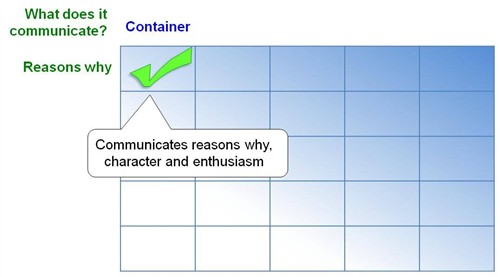
Some people think that the Creation story is like that. For them it’s not trying to communicate what God did, or how long he spent doing it or what order he did it in. It’s acting like a container – somehow it contains something of God’s character and enthusiasm (“It was good” – God made the universe and he loved it). And it gives you an insight into the reasons why.
Layer 2Let’s look for another layer of meaning. First of all in Sally’s work.
“My work is like being a repair man. People expect you to be able to tighten up some nuts and bolts, put in some oil, unblock a few tubes, put in some spare parts and get everything good as new. Sometimes it isn’t that easy.”
“My work is like being a gardener: looking after little seedlings, feeding and pruning them, removing pests, trying to help the plants be at their best”
Just from the story, what can we say about what does Sally do at work? Fixes something. Tries to make something at its best. It’s a picture isn’t it. Her work isn’t really as a repair man or a gardener. It’s a metaphor or analogy or a parable.
So we get some principles about Sally’s work, and it stirs our imagination, thinking about unblocking tubes and putting in spare parts, feeding and pruning. But you shouldn’t really take it literally.
Once again we have no idea how long Sally spends at work. Or what order she does things in. And actually we haven’t really said what Sally does. The story is a parable.
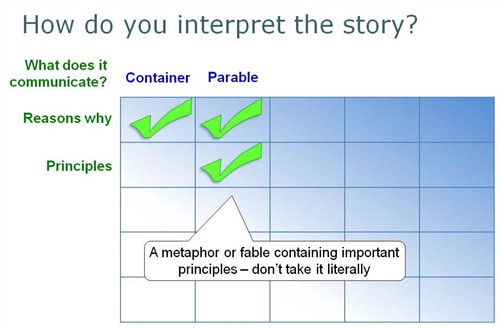
And some people think the Genesis story is like that. For them it’s a parable. We get some important principles about God’s work and it stirs our imagination thinking about things happening in response to his words. For them it is not about taking it literally, it isn’t saying how long God took, or what order he did things in, or even really what happened. Maybe it’s just a parable.
And really no-one is disagreeing too much about those principles that are in the Genesis story.
Here are some of the important principles that you can find:
• The physical world is good
• Humans are special
• It is good to be creative and make things
• It is good to have a pattern of rest in your life
And here is the longer list - longer than the piece of scripture itself in fact, which shows how effective story is in communicating principles.
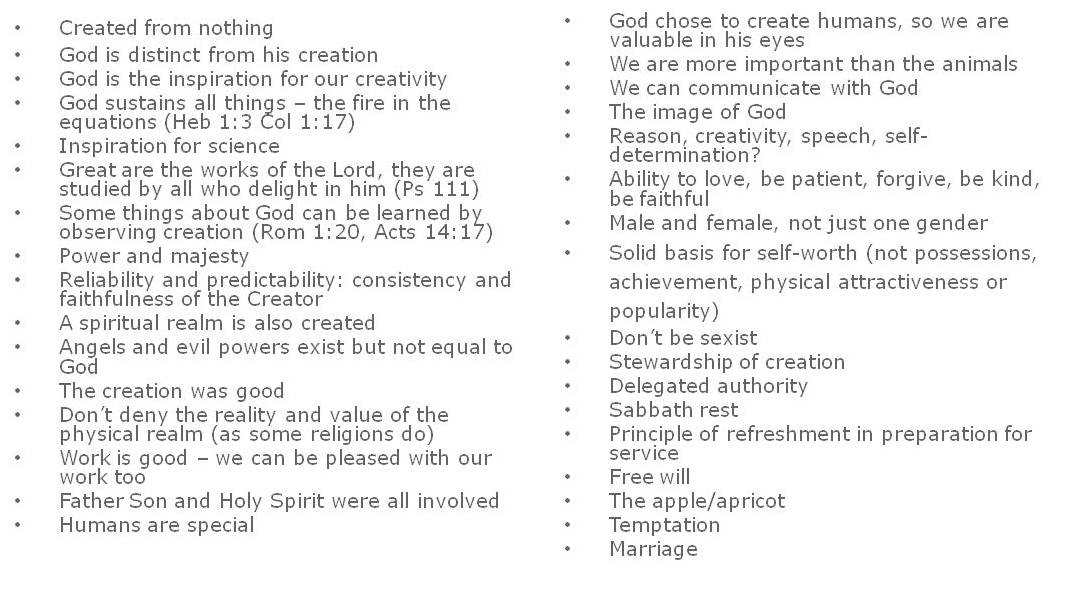 Layer 3
Layer 3Let’s look for another layer. Over to Sally.
“At 8 o’clock I leave the house
At 9 o’clock I have a meeting with the other doctors
At 10 o’clock I see some patients, find out what’s wrong, and help them get better
At 11 o’clock I see some more patients ?do some paperwork
At 12 o’clock I visit a sick person at home
At 1 o’clock I have lunch”
Do you recognise this kind of story? Those of you with children certainly will. Telling a story like this is a well-known literary framework.
Sally has finally told us that she is a doctor. We know what happens.
Here’s a teaser for you. In what order does Sally do things at work? It may seem clear, but actually it isn’t always quite like that. How long does it take her to get to work? 1 hour? How long does her meeting with the other doctors take? 1 hour?
So was she lying when she told us these times? No. You’ve seen stories told in this form before. Poetry works like this too – it’s really hard to make a sonnet scan and rhyme, so you don’t expect everything to be exactly as it says.
Sally didn’t mean the times to be exact? How long does she spend at work? We don’t know. Far too long usually. Sore point.
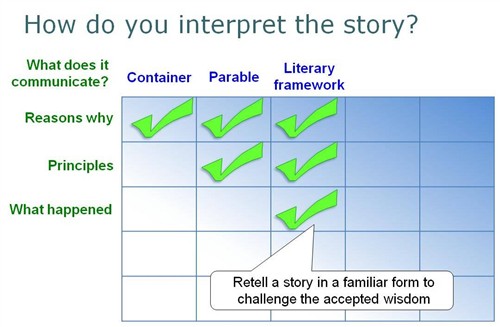
In the same way some people understand Genesis 1 is a literary framework – it has layers of spiritual truth and it also explains what happened, without necessarily telling us the sequence or length of time involved. The story form shouldn’t be confused with the contents.
As you read the Genesis 1 story you will notice some phrases happen over and over again:
“And God said, Let the X”
“And God saw that it was good”
“And there was evening and morning – the nth day”
So that is a clue that there is a poetic or literary form going on.
If you draw it up like this you can see another pattern:
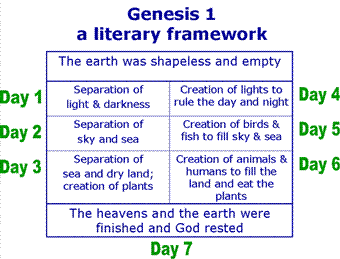
The universe was Shapeless (formless) and empty: the first three days give it form and the next three days fill it.
So why this particular literary form?
Well it turns out that there are other stories in a similar form. This one in particular – enuma elish – is a Babylonian creation story, in seven sections, written on seven tablets of stone. The Babylonian god finished his work within the span of 6 tablets of stone. The last and 7th stone exalted the handiwork and greatness of the deity's work. Is it possible that Genesis was written during the Babylonian exile to challenge the creation myth of the culture?
Here’s part of the Babylonian story:
Marduk challenges sea-godess Tiamat to combat and destroys her. He then rips her corpse into two halves with which he fashions the Earth and the heavens. Marduk then creates the calendar, organizes the gods of the planets and stars and regulates the moon, sun, and weather. The gods pledge their allegiance to Marduk and he creates Babylon and its god-king as the terrestrial counterpart to the realm of the gods. Marduk then destroys Tiamat's husband, Kingu using his blood to create mankind so that they can do the work of the gods. There’s lots more to it, but you get the idea.
The Genesis account of creation challenges many of the understandings in enuma elish.
In Genesis:
• Creation is NOT the outcome of anger and fear, war and destruction, hatred and violence, betrayal and murder, chaos
• It is NOT about subjugation of females by males
• Humanity is NOT an afterthought or a byproduct, we are NOT of little value to God
• There are NOT gods of light & darkness, sky and sea, sun moon and stars, earth and vegetation, animals – because in fact God made them all.
• Kings and heros are NOT gods – there is only one God.
So Genesis, as well as giving us a host of spiritual principles also tells us what happened (in a deliberate contrast to other creation stories):
• God created everything out of nothing, then gathered and used the basic chemical components to make other things
• The creation is separate from God
• It was created in stages: it was formless and empty and he formed it and filled it
• The universe is orderly
The Literary Framework retells a story in a familiar form, either as poetry or to challenge the accepted wisdom. It communicates truth in terms the listeners can understand. We can respect Genesis as the best communicative tool for an ancient audience.
So far we have three layers of meaning in the Genesis creation account:
• It helps us get to know God.
• There are many principles for thinking and living.
• It tells us what happened.
Layer 4Are there some other layers of meaning in those Days?
Sally, Tell us what you do at work.
“No, you tell us what you do at work!”
I started work on my most recent project just before Christmas last year. On Day Zero we all got together in Reading and worked out how we would build the website and call centre and get it all ready to go live on Day One – a date which was not allowed to move. So that meant we left out lots of things and put them in the plan for what we called Day Two.
“How long did it take to get the website and call centre ready to go live?” 4 months.
“So when was Day Two?” 3 months later
“How come you said it was Day Zero, Day One and Day Two?” Day Zero just means the start of the project. Day one was the first day of our new system. We called it Day 2 because that was the day when our second lot of work was finished. It is jargon to explain the stages of work and the order of doing things.
Has anyone else ever heard people talking about “On day one” when they don’t literally mean Day One?
Some people understand Genesis 1 as a Day Age theory.
So they find in it:
A layer of reasons why
A layer of principles for living
What happened
But we also have a layer of truth about the sequence: the days are stages or ages, and they can be as long as was needed.
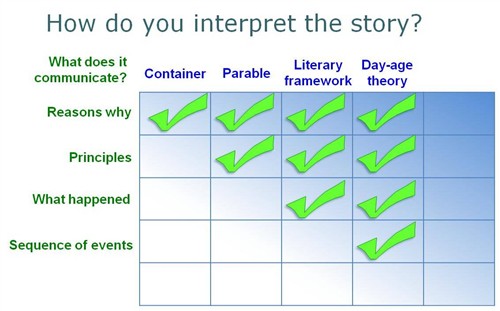
Day age theorists see a rough parallel between Genesis and evolution – the sequence is the important thing.
The Hebrew word for day (yom) can mean an age or era – the day or age of the mobile phone.
This idea is amply supported in other scriptures which say “A thousand years in your sight are like a day that has just gone by” – and there are others in the new testament too..
Here’s what the theory ends up looking like. On the
website resources page I’ve given you some links to the research that tries to tie science together with the Day Age theory.
But people who choose the Day Age theory still a bit of explaining to do when some aspects of the sequence in the Bible differ with the majority scientific understanding of the order of things.
Layer 5Lets look at one more layer of possible meaning for those Days. But first over to Sally.
Sally, tell us about your work.
“I work on Thursdays and Fridays at the doctor’s surgery in Chapeltown. I have a meeting with the other doctors at 8.30 on Thursday, and then I see patients from 9.30-11.30, and prescribe medicine or refer them to a specialist. Usually I will do a couple of home visits and then study on Thursday afternoon. On Friday it is much the same, but in the afternoon I see more patients in the afternoon from 4-6pm.”
You now know quite a lot about Sally and her work. Five layers. You know the reasons why and what’s important to her at work – some of the principles. You know what she does and the order she does it in. And the extra thing you know this time is how long each part of her work takes. Sally was telling you her timetable (actually for a couple of years ago).
Some people understand Genesis 1 to have these five layers and this is called Young Earth Creationism, because the extra layer – how long it took – means that the earth must be very young.
So in Genesis Young Earth Creationists find:
• Reasons why
• Principles for living
• What happened
• Sequence of events
• AND how long it took.
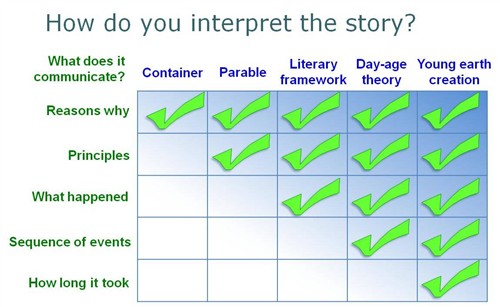
The key belief in Young Earth Creationism (which has huge support in America, by the way) is that the entire universe (or sometimes just the earth) is understood to have been created in six 24-hour days (not over a period of 15 billion years as most scientific disciplines say).
Biblical genealogy (lists of parents and children in some books of the Bible) are used to estimate the age of the universe – Bishop Ussher came up with a date of 4004BC, others have extended it slightly.
Young Earth Creationists believe that true science will eventually agree with a literal reading of Genesis 1. In the past couple of years new institutions such as the Discovery Institute in Seattle have been established to advance this cause. There is a real challenge to harmonise the scientific evidence with this understanding of Genesis. Very big in America and there are many websites devoted to this subject.
You may come across Flood Geology as a way of explaining fossils that look much older than 6000 years.
Or the “apparent age” theory. God made it look old (which makes God a deceiver on a grand scale).
Most Young Earth Creationists are in fact selective about which parts of the scriptures they take as literal. Take for example Bible verses such as Ps 104:5 "The LORD set the earth on its foundations; it can never be moved" And in Ecclesiastes "The sun rises and sets and returns to its place”
You probably know that Galileo clashed with the church scholars over this when he challenged the conventional science of the time which said that the earth did not stand still at the centre of the universe – the geocentric view. He realised that everything did not go round the earth – things like the planets went round the sun. And so the earth was actually moving.
Nowadays Geocentrism is a fairly rare point of view, but it does illustrate the difficulty of claiming to have a totally literal interpretation of the Bible. Very few actually do.
A spectrum of interpretationsI want to help you understand this as a spectrum of interpretations and that’s what’s on these little cards. Carefully designed to slip into your Bible in the Genesis area.
That diagram on one side of the handout cards is the layers of meaning that we’ve just been talking about.
And the other side has the technical words for the different interpretations. In full colour because it’s a spectrum. Sorry for the technical words. If you search for something simple like creation on Google you will tend to find only the extreme opinions. I’ve used the proper technical terms that will help you find things if you want to research it more at home. And I’ve put the best links and books, videos, podcasts I can find for each interpretation on the resources page. If you find better ones, please do add a comment on the website.
The tendency to polarise and caricature So why a spectrum?
There is a tendency to polarise the debate as if there were only two options “creation” or “science”.
• And so in the media, the church is portrayed as “outraged” because conflict makes a good story.
• Each new discovery is presented as science triumphing over primitive notions such as faith.
• Non-fiction writing sells best as a polemic “against something”
• In fiction – Dan Brown “Angels and Demons” assumes science and faith are pitted against each other
• Richard Dawkins, professor for the advancement of public understanding of science is a passionate atheist and uses his platform of scientific credibility to promote his atheistic beliefs
And so it is a caricature to talk about a “creationist” as if there were only one way of thinking about creation. In fact there is a spectrum of interpretations.
And this is shown on the other side of the card you have been given
A spectrum of interpretations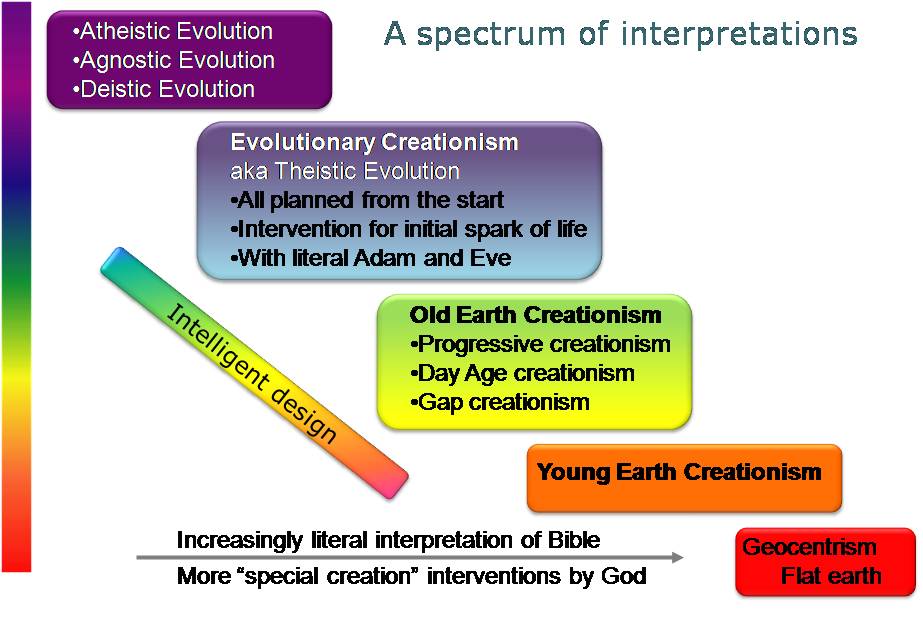
Starting at the bottom right in red we have the Flat Earth Society and Geocentricity.com. They actually exist and turned up at a climate debate in November. I quote “We maintain that the Bible teaches us of an earth that neither rotates daily nor revolves yearly about the sun; that it is at rest with respect to the throne of him who called it into existence; and that hence it is absolutely at rest in the universe.” Incredible.
In orange, much more common, we’ve talked a bit about Young Earth Creationism – the view that creation was a series of events over six days. And if we find evidence that appears to make it seem like it was a longer process, that is remnants of the flood.
Then there is Old Earth Creationism. There are actually at least three flavours, and I just explained the middle one: Day-Age creationism.
Each day of creation took ages: millions of years, guided by God
Next time we’ll look at evolutionary creationism – the idea that the emergence of life and evolution was God’s idea, design, and plan from the beginning – it was the way he did it.
And for completeness, there are a few more. Deistic Evolution is where God is a kind of force not a person. You might hear of the conversion of an atheist philosopher called Antony Flew who now says there is a God – not a personal God he can get to know - so that is deistic evolution
Agnostics say we cannot know. So, as an example John Humphreys book is called “In God we doubt”
And the atheists say science will explain everything; God is an unnecessary notion and the well-known example is Richard Dawkins.
Finally, on the diagonal, with supporters across several of these traditions is Intelligent Design which says there is evidence of complexity in the way things work which proves there must be a God. More about Intelligent Design next time.
Aims and applicationSo let’s have a look at what you can do with this stuff.
When I started, I said the aims of this series were:
• To read the Bible properly
• Think about God and science together
• Spot the bias
• Do science at school
• Avoid the creationist caricature
• Worship God inspired by science
I’m just going to pick out a couple of those today
Read the Bible properly• Understand the original context. So with Genesis 1, I am suggesting that the context was countering the other creation stories of Babylon during the exile.
• Recognise different kinds of literature in the Bible. Not every passage is to be understood as literal. I think Genesis 1 is a literary framework with some poetic elements rather than a scientific paper.
• What was the author trying to communicate? I think it was a set of principles about how to live, and I think he was saying what happened, but not the sequence or the method or how long it took. Others have different views in a wide spectrum of interpretation (and you are welcome here whatever your view is).
Think about those video clips. I want you to realise that in each of them, Sally and I told the truth about our work. Sometimes we intended just to give you a glimpse of our principles, sometimes it sounded like they Sally was talking about a timetable but she wasn’t, and in the end she actually was talking about a timetable. But they were all telling the truth.
Read the Bible properly.
Avoid the creationist caricatureSometimes I wince when people talk about what “Christians” are doing or saying that conflicts with science. Don’t you? You will hear “creationists” accused of all kinds of things, and may feel pressure and the headache of trying to believe apparently conflicting things.
The first step is to spot the caricature – it is probably a particular position which is being lampooned.
Think of the spectrum and translate it in your head – often it’s Young Earth Creationism – and remind yourself that they’ve missed out the other points of view in the middle.
• Remember the spectrum (often the term used is “creationists say” – but not all creationists say the same things)
– Young earth creationism
– Old earth creationism
– Evolutionary creationism
• Rename or reflect back which kind of “creationism” more accurately depending on what is being said. That’s really all I do when it crops up with people at work. Just clarify that the young earth creationists may believe that, but I believe this. And I think it is entirely reasonable.
• Express your enjoyment of science AND your love for God
• Stand up for your basic beliefs
Relate to Christians who think differently Sometimes I wince even more when I’m with a Christian who thinks differently to me. Especially in a mixture of Christians and not. This isn’t easy – some people have very complicated arguments. My suggestions are:
• Acknowledge your common faith
• Explain that the different views exist
• Have a humble attitude, openness to change: “At the moment I find x the most useful way to understand things”
• Explore each other’s influences
• Don’t make personal criticisms; remain calm
o Even if the other person doesn’t
Coming upWe’ve a couple more instalments in this series and you’ll hear people telling their own stories and take brief look at some of the key issues in this discussion:
• What do you make of the theory of evolution
• Randomness and intelligent design
• Genesis 3 – Adam and Eve
• What makes us special as humans
I’ll be here to chat afterwards, and happy to come to your housegroup or whatever if you want to take the discussion further.
It is by faithI want to leave you with one thought. Science will never prove or disprove God.
Heb 11:3 says “It is by faith we understand that the universe was formed at God’s command.”
May each of us be able to have both faith and understanding as we look at the universe God has made. May God’s creation inspire our worship as we understand it more. May we be able to explain our faith in the Creator to those who see the mechanisms but not the purpose or the person behind it all.
David Wallace, 25/01/2009